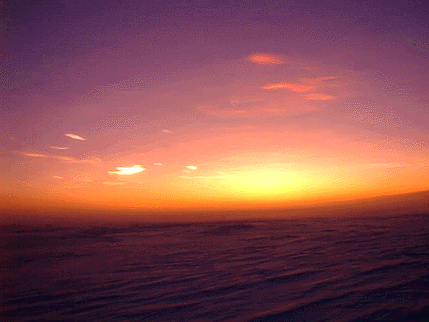Contents
Highlights of the 1997-1998 research season
Sea-ice conditions force Cape Roberts drill team to withdraw early
RADARSAT: Making a digital mosaic of Antarctica
Science notebook: News from Antarctica and beyond
Current Antarctic Literature highlights
1997-1998 austral summer field season begins early
Glaciological delineation of the dynamic coastline of Antarctica
Antarctica and sea-level change
Foundation awards of funds for antarctic projects, 1 October 1996 through 31 January 1997

For the first time in 160 days, the sun begins to rise over McMurdo Station, Antarctica, on 19 August 1997. Though austral spring is still a month away, the sun's return means resumption of flights to and from the base--and the end of isolation for the 154 Americans who spent the winter at the station. Within days of the sunrise, 60 new staff members as well as fresh food, newspapers, and mail were delivered to McMurdo. The rising sun also marks the beginning of a new field season on the southernmost continent.
The National Science Foundation (NSF) provides awards for research and education in the sciences and engineering. The awardee is wholly responsible for the conduct of such research and preparation of the results for publication. The Foundation, therefore, does not assume responsibility for the research findings or their interpretation.
The Foundation welcomes proposals from all qualified scientists and engineers and strongly encourages women, minorities, and persons with disabilities to compete fully in any of the research- and education-related programs described here. In accordance with federal statutes, regulations, and NSF policies, no person on grounds of race, color, age, sex, national origin, or disability shall be excluded from participation in, be denied the benefits of, or be subject to discrimination under any program or activity receiving financial assistance from the National Science Foundation.
Facilitation Awards for Scientists and Engineers with Disabilities (FASED) provide funding for special assistance or equipment to enable persons with disabilities (investigators and other staff, including student research assistants) to work on NSF projects. See the program announcement or contact the program coordinator at (703) 306-1636.
The National Science Foundation has TDD (Telephonic Device for the Deaf) capability, which enables individuals with hearing impairment to communicate with the Foundation about NSF programs, employment, or general information. To access NSF TDD, dial (703) 306-0090; for FIRS, 1-800-8339.
The Antarctic Journal has had several changes since its inauguration in 1966 as a medium for information about, and related to, the U.S. Antarctic Program. The magazine belongs to you, its contributors and readers. As always, NSF welcomes ideas for improvement. Comments should be sent either to WReuning@nsf.gov or to Editor, Antarctic Journal, Office of Polar Programs, National Science Foundation, 4201 Wilson Boulevard, Arlington, Virginia 22230.
The Antarctic Journal invites contributions from members of the antarctic science, logistics, and policy communities who want to communicate their work and ideas to an audience that combines specialists and scientifically literate nonspecialists. The Antarctic Journal is not peer reviewed but rather provides reports on U.S. activities in Antarctica and related activities elsewhere and on trends in the U.S. Antarctic Program.
| Reminder: The deadline for submitting articles for the 1997 review issue of Antarctic Journal of the United States is 30 November 1997. The September 1997 online issue contains author guidelines for the 1997 review issue, as well as information about submitting materials for the new online issues. |
